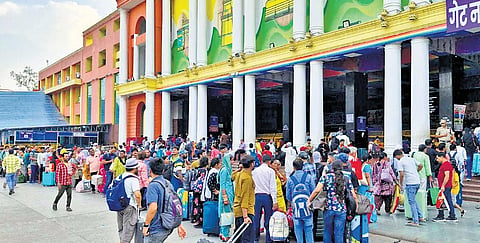

NEW DELHI: Despite a wave of flight and train cancellations following rising tensions between India and Pakistan, Delhi’s transport hubs remained surprisingly calm. But beneath the composed surface, anxiety ran deep as travellers grappled with difficult decisions amid growing fears of a potential conflict.
At the Indira Gandhi International Airport, where over 130 flights were cancelled on Thursday, passengers queued up silently, scanning airline websites and social media for real-time updates. Authorities, quick to respond, ensured smooth crowd management and bolstered security presence across terminals. “There was no chaos, thankfully,” said Manas Kulhad, a corporate professional flying out for work from Terminal 3. “But there’s always that fear at the back of your mind. I just hope no drone or missile attack happens when I’m in the plane. This is a work trip. I have already cancelled my vacation plans” he added.
Security was visibly tightened, with armed personnel stationed across the airport and passengers undergoing multiple layers of checks. Still, there was no visible panic.
People moved briskly but orderly, many with faces marked by tension and concern.
At the New Delhi Railway Station, similar scenes played out. Long queues formed outside the gates as security checks slowed the entry process.
Passengers and porters rushed across platforms, trying to avoid delays. Yet, order prevailed. “We were a little afraid of having to make this journey during such an emergency, but we didn’t have much of a choice. But to our relief, the situation seems to be completely under control and there is no panic situation here,” said Shweta Jaiswal, a passenger travelling to Lucknow. However, for many, the risks were too great to ignore. “I had planned a weekend trip to Amritsar with my family, but given the current tensions, we decided to cancel.
Safety comes first,” said Amit Mehra, a software engineer from Noida. The travel disruptions come in the wake of the deadly April 22 terror attack in Pahalgam, which has escalated diplomatic and military tensions between the two nations.
Meanwhile, workplaces across the NCR region also responded swiftly. Several companies implemented early leave policies and offered flexible work-from-home options.